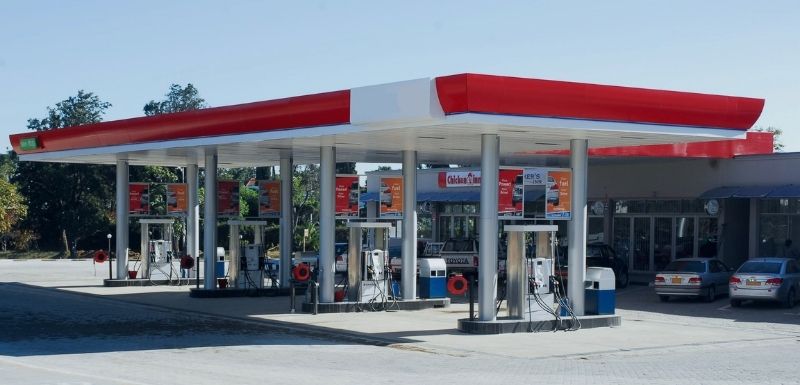In many parts of Latin America, you don’t pump your own gas — there are attendants who work the pumps (las bombas). So if you’re driving in a Spanish speaking country, it pays to know some Spanish phrases for the gas station.
Gas Station Vocabulary with Regional Variations
Spanish vocabulary can vary a lot from country to country.
How to say gasoline in different Spanish speaking countries
| La gasolina | Gasoline |
| La nafta | Gasoline (Argentina, Uruguay, Paraguay) |
| La bencina | Gasoline (Chile) |
| Magna/verde | Regular gas (Mexico) |
| Premium/rojo | Premium gas (Mexico) |
| Diésel / gasoil | Diesel (most countries use one or both of these terms) |
How to say Gas Station in different Spanish speaking countries
| La gasolinera | Gas station (Most commonly used term broadly) |
| La estación de servicio | Gas station (Used more in South America and Spain) |
| La bencinera | Gas station (Chile) |
| La bomba de gasolina/bencina/nafta | Bomba de [local word for gas] is a colloquial term used in many places |
| El surtidor | Bolivia, Paraguay |
| El grifo | Peru |
How to say tires in different Spanish speaking countries
| Las llantas | Tires (Most of latin america; more common in Central America & Mexico) |
| Los neumáticos | Tires (Also common, especially in South America) |
| Las gomas | Tires (Puerto Rico and Dominican Republic) |
| Los cauchos | Tires (Venezuela) |
| Las ruedas | Technically means wheels, but you might hear this used to refer to tires “e.g., la presión de las ruedas“) |
You don’t need to memorize all of these words or where they’re used, but it’s helpful to get somewhat familiar with the differences you’ll encounter.
How to Ask for the Nearest Gas Station in Spanish
You’re driving along in lovely Oaxaca, Mexico, and notice you’re on empty. You pull into a restaurant for a break and ask the server…
| “¿Me puedes decir dónde está la gasolinera más cercana?” | Can you tell me where the closest gas station is? |
| “¿Sabes dónde hay una gasolinera cerca de aquí?” | Do you know where there is a gas station close by? |
They might reply,
| “Sí, hay una Pemex a unos 2 kilómetros en esta misma carretera. La vas a ver a la derecha.” | Yes, there is a Pemex around 2 km from here on this same highway. You’ll see it on the right. |
Or, maybe you’re in the car with a Spanish speaker when you notice you’re on empty. You might say…
| “Se nos acaba la gasolina… deberíamos parar en la próxima gasolinera.” | We’re running out of gas… we should stop at the next gas station. |
Talking with the Gas Station Attendant
When you pull up to the estación de servicio, you’ll need to talk with the attendant. Here are some useful phrases:
| Écheme diez litros (de gasolina), por favor | Give me 10 liters (of gas), please |
| ¿Me echa diez litros, por favor? | Can you give me 10 liters, please? |
| Lleno, por favor | Full, please |
| ¿Me lo llena, por favor? | Can you fill it up for me, please? |
You might also want them to check other things on your car. For that, the phrase “Me podría _____?” (meaning could you do X for me) will come in handy.
| ¿Me podría revisar la presión de las llantas, por favor? | Could you check my tire pressure, please? |
| ¿Me podría revisar el aceite también? | Could you check my oil too? |
| ¿Me podría limpiar el parabrisas, por favor? | Could you clean my windshield, please? |
Spanish phrases for inside the convenience store/gas station
You might find yourself inside the gas station at some point, and in there you’ll definitely need to use your Spanish to interact with the cashier (el cajero/la cajera).
Here’s how a checkout dialogue with el cajero/la cajera might go:
| You: Hola, buenas (as you put your things on the counter) | Hi, good afternoon |
| Them: Buenas tardes. Sería todo? | Good afternoon. Will that be all? |
| You: Sí, esto nada más | Yes, that’s it |
| Them: Quieres una bolsa? | Do you want a bag? |
| You: No, gracias | No thanks |
| Them: Vas a pagar con tarjeta o efectivo? | Are you paying with card or cash? |
| You: Con tarjeta | With a card |
| Them: Bueno. ¿Necesitas un recibo/comprobante? | Ok. Do you need a receipt? |
| You: No, gracias. Hasta luego | No thanks. See ya |
| Them: Que tengas un buen día | Have a good day. |
Talking about the gas station after the fact
Lastly — to really cover all the angles here: what if you want to tell a story related to the gas station later?
For that, you’ll need a bit of preterite (aka past tense).
[Related: How to Conjugate the Verb Poder in Spanish (8 Need-to-Know Tenses)]
Here’s a story related to a gas station, which includes some Spanish phrases for the gas station that you might use. It also incorporates the preterite and imperfect past tenses:
| Tenía el tanque casi vacío, así que tuve que parar en la primera gasolinera que vi. | My tank was almost empty, so I had to stop at the first gas station I saw. |
| Y bueno, llegué y le pedí al chico que me llenara el tanque. | And so I got there and asked the guy to fill up my tank |
| Después entré en la tienda y adivina quién estaba trabajando allí…. The Rock! En serio! Parece que perdió todo su dinero y tuvo que encontrar un trabajo. | Then I went inside and guess who was working there… The Rock! Seriously! I guess he lost all his money and had to find a job. |
What now?
You learned these phrases — now put them into practice! Add them to Anki or your notebook. Create your own sentences with these words.
Want a clear plan to follow to learn conversational Spanish? Reach out to me here to learn more.


